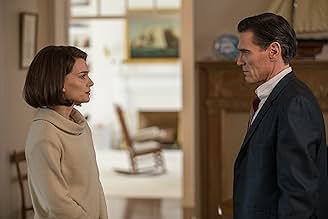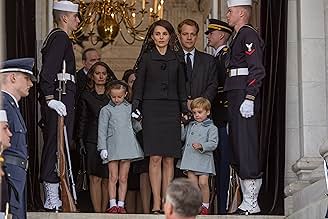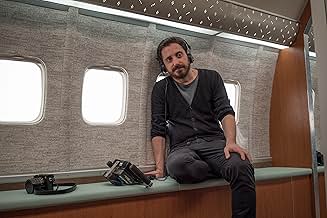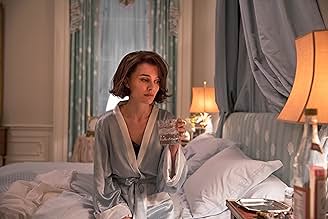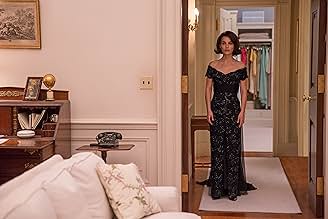Tras el asesinato del presidente John F. Kennedy, la primera dama Jacqueline Kennedy se enfrenta a la aflicción y al trauma para recuperar su fe, consolar a sus hijos y determinar el legado ... Leer todoTras el asesinato del presidente John F. Kennedy, la primera dama Jacqueline Kennedy se enfrenta a la aflicción y al trauma para recuperar su fe, consolar a sus hijos y determinar el legado histórico de su marido.Tras el asesinato del presidente John F. Kennedy, la primera dama Jacqueline Kennedy se enfrenta a la aflicción y al trauma para recuperar su fe, consolar a sus hijos y determinar el legado histórico de su marido.
- Dirección
- Guión
- Reparto principal
- Nominado para 3 premios Óscar
- 44 premios y 170 nominaciones en total
Reseñas destacadas
Essentially this is a film where I liked everything, but didn't love much. The only things that I absolutely loved was Natalie Portman's acting as Jackie Kennedy. She really exuded her character and became Jackie Kennedy. it was great! The other thing I loved was John Hurt as the priest which was a lovely surprise.
Overall, this was a simple film but it wasn't daring. It didn't risk take like other films would and therefore in that regard may be a bore for some.
From the first awful note, the music of Mica Levi is intrusive, jarring, and totally wrong for this type of film. It even drowns out dialog it's so loud. Aside from the clip of Richard Burton singing "Camelot," the film seems to exist in a time warp, with zero cultural references allowed to intrude other than old news footage.
We are told Jackie is being interviewed in Hyannis Port, Massachusetts, but the house and surrounding grounds look nothing like the famous Kennedy compound or Cape Cod. Even footage filmed in Washington, DC looks oddly phony since the city has changed so much since 1963.
The scenes where Jackie spars intellectually with the journalist (Sarsgaard as Theodore H. White, but they never use his name) and the priest (John Hurt) are so foolish they almost seem like comedy skits. There's also a long and needless scene with Richard E. Grant as a designer working with Jackie as she obsesses over interior decoration for the White House.
During the long screen time devoted to recreating Jackie's famous televised tour of the White House in 1961, she talks about the stage that was built in the music room when Pablo Casals played there, but the following scene shows him seated and playing not on a stage.
Other historical characters from the Johnsons to Jack Valenti are glimpsed as being generally unfriendly and outrightly evil, but nothing is developed. It's as if all this history is just a vague backdrop for Jackie to emote in front of. Perhaps it's an accurate comment about a woman who is so self-obsessed, her hours after the assassination are spent worrying about what will become of her and where she will live.
And that's the main issue here. We're shown a Jackie who is constantly self-obsessed rather than self-assured. She's a heroine for the selfie generation rather than a real and accurate product of her time.
The scene ideas are painfully simple, though highly effective. From sharing the impossible news with her kids, to deciding when/how to move out, to asking million-dollar questions of the priest ("What kind of God takes a father away from his two little children?"), the movie includes moments we all know must have happened to Jackie but were buried under the public hysteria around the event itself. As intoned by the funeral planner, "The world's gone mad."
Jackie makes small talk in the hearse with Bobby Kennedy while her dead husband (his dead brother... America's dead president) lies in the hulking casket between them, causing our focus to oscillate between the weight of what we hear and what we see. Later, as she staggers through the White House at the end of the longest day of her life - still donning her blood-soaked pink dress that would soon find a permanent home in infamy - Jackie personifies crippling isolation in body and in mind. The non sequiturs that tumble out during these dreadful sequences ("How will we afford to put the kids through school now? Maybe we can sell some of the furniture?") are as heartfelt as they are ludicrous. No matter where she is or what she's doing, Jackie reacts like any commoner would. She just happens to be doing so as the First Lady.
The film works because Portman is the most believable Jackie O ever put on screen. From the outset, she is in total control of her confusion, fear, helplessness, exasperation, guilt, long-held duties as a mother, brand-new duties as a *father, alongside her esoteric responsibilities to the nation. Portman puts on an acting clinic by conveying her predicament through nuance. We learn as much about Jackie's state of mind from what she doesn't say as from what she does, because no matter how carefully she speaks or how badly she wishes to be understood, it becomes clear that no words could ever meet the moment.
Characters often stare pleadingly into the camera's eyebrow, as if searching for an escape hatch from the audience. The score is populated by discordant whole notes that produce similar unease. Even the photography is at once stunning and unsettling, given the underlying darkness that has eclipsed the light of society. In the end, we feel the world on edge, suspended in time, waiting for normal life to resume. This film concerns the looking back required before it is possible for Jackie Kennedy (or for any of us) to make sense of the loss and start again. The same looking back required "to let them see what they've done."
We could make the argument that JFK didn't have much of a positive legacy, given his poor record on civil rights (upon which Johnson sought to improve) and an undeclared war on Cuba. Even so, the era was seen as the culmination of the possible. I recommend the movie.
Larraín also directed 2012's "No", about the TV campaign that led to Augusto Pinochet's defeat in the 1988 election.
¿Sabías que...?
- CuriosidadesAfter Natalie Portman was cast, to Pablo Larraín's wishes, he asked screenwriter Noah Oppenheim to tear out any pages of the script that didn't contain scenes with Jackie Kennedy, as he wanted this movie to be entirely about her and her experiences. The 120-page script was trimmed to one hundred pages, all containing Jackie.
- PifiasJackie has the list of funeral attendants read out to her, including "Crown Prince George" of Denmark. Denmark at the time did have a Prince George, but he wasn't Crown Prince. Rather they had a Crown Princess, the later Queen Margrethe. And the only Danish dignitary who attended the funeral was the Prime Minister, Jens Otto Krag.
- Citas
The Priest: There comes a time in man's search for meaning when he realises that there are no answers. And when you come to the horrible and unavoidable realization, you accept it or you kill yourself. Or you simply stop searching.
- ConexionesFeatured in WatchMojo: Top 10 Movies of 2016 Already Getting Oscar Buzz (2016)
- Banda sonoraAffection No. 3
Composed by Paul Zaza (as Peter Dufferin)
Published by Parry Music
Courtesy of Latin Music Publishing, Inc.
Selecciones populares
- How long is Jackie?Con tecnología de Alexa
Detalles
- Fecha de lanzamiento
- Países de origen
- Sitios oficiales
- Idiomas
- Títulos en diferentes países
- Jackie: De Nhat Phu Nhan
- Localizaciones del rodaje
- Empresas productoras
- Ver más compañías en los créditos en IMDbPro
Taquilla
- Presupuesto
- 9.000.000 US$ (estimación)
- Recaudación en Estados Unidos y Canadá
- 13.960.394 US$
- Fin de semana de estreno en EE. UU. y Canadá
- 278.715 US$
- 4 dic 2016
- Recaudación en todo el mundo
- 29.778.202 US$
- Duración
- 1h 40min(100 min)
- Color
- Relación de aspecto
- 1.66 : 1







